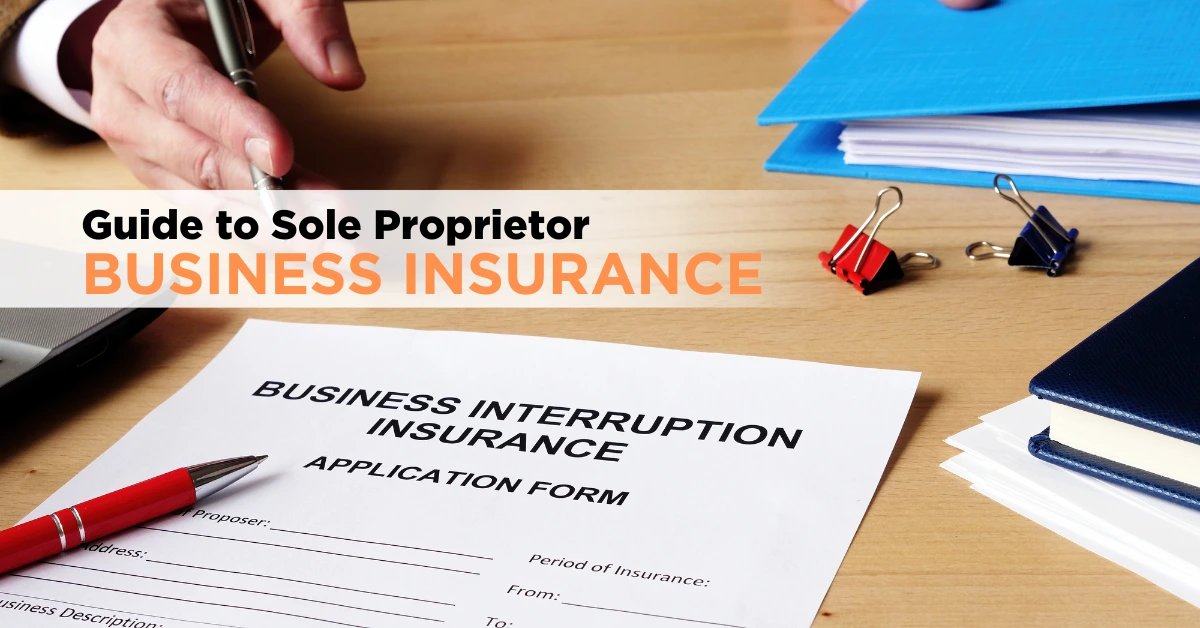Starting and running a sole proprietorship can be an exciting task. It is a journey of turning your passion into profit. As a sole proprietor, you are the driving force behind your business, responsible for its success and well-being. Amidst the excitement, it is essential to consider the safety net of business insurance to safeguard your venture against unexpected risks.
Can you get business insurance as a sole proprietor? This guide will explore the pros and cons of sole proprietor business insurance. It will let you make informed decisions for the endurance of your enterprise.
Understanding Sole Proprietorships and Business Risks
It is a simple business structure where an individual owns and operates a business. While this setup offers independence and minimal administrative burden, it also risks the owner’s assets. From property damage to customer injuries, the risks can be substantial and potentially devastating for a single person.
Does a sole proprietor need business insurance?
A sole proprietor can significantly benefit from having business insurance. It is not always a legal requirement. It is a wise investment that provides several crucial advantages. Here is why a sole proprietor should seriously consider getting business insurance:
Liability Protection:
As a sole proprietor, you are personally responsible for your business’s liabilities. If your business is sued for any reason –a customer injury, property damage, or a mistake in your services – your assets could be at risk. Business insurance protects liability, covering legal fees, settlements, and judgments.Asset Protection:
If your business relies on equipment, tools, inventory, or other assets, insurance can help repair or replace these items if they are damaged, lost, or stolen.Professional Reputation:
Having insurance can enhance your professional reputation. It shows your clients and customers that you are committed to responsible business practices and protecting their interests.Client Requirements:
Many clients, significantly larger corporations or government entities, require proof of insurance before doing business with you. Having insurance can open doors to opportunities that might otherwise be closed.Business Continuity:
Insurance, such as business interruption coverage, can help you recover lost income. Moreover, it may help you continue operating in the face of unexpected events like fires, natural disasters, or other disruptions.Peace of Mind:
Knowing you are protected by insurance can provide peace of mind. It allows you to focus on growing your business without worrying about potential financial setbacks.Personal Asset Protection:
Business insurance can separate your assets from your liabilities. In the event of a lawsuit, your assets, like your home, car, and savings, could be at risk without proper insurance coverage.Legal Compliance:
Depending on your location and industry, you might be legally required to have insurance. Ignoring these requirements could lead to fines, penalties, or legal troubles.Unforeseen Expenses:
Running a business involves uncertainty. Without insurance, unexpected events or lawsuits could happen. It may lead to significant out-of-pocket expenses that crush your business.
Types of Sole Proprietor Business Insurance
- General Liability Insurance: This is the foundational insurance for any business. It covers legal costs and settlements if your business is sued due to property damage, bodily injury, or advertising-related claims. General liability insurance covers you if a customer falls in your store or a product you sell causes harm.
- Professional Liability Insurance: If you provide professional services, this insurance protects you from claims of negligence, mistakes, or inadequate work. It is crucial for consultants, freelancers, and professionals in law or accounting.
- Property Insurance: Even as a sole proprietor, you likely have valuable business property such as equipment, inventory, or tools. Property insurance covers loss or damage caused by theft, fire, vandalism, or natural disasters.
Business Interruption Insurance: If your business operations are interrupted due to covered events, such as a fire that damages your workspace, this insurance can compensate for lost income and ongoing expenses.
- Product Liability Insurance: If your business involves manufacturing or selling products, this insurance safeguards you against claims arising from defective or harmful products that cause injury or damage.
Home-Based Business Insurance: If you run your sole proprietorship from home, your homeowner’s insurance might not cover business-related losses. Home-based business insurance extends coverage to your business assets and liabilities.
Assessing Your Insurance Needs
- Identify Risks: Carefully analyse the potential risks associated with your business. Are you interacting with clients in person? Do you sell products that could lead to injuries? Understanding your risks helps you tailor your insurance coverage.
- Evaluate Industry Standards: Research your industry’s insurance standards and regulations. Certain enterprises might have specific insurance requirements to adhere to.
- Estimate Coverage Costs: Calculate the estimated cost of coverage by considering essential factors. It includes the nature of your business, revenue, location, and the coverage type you need. Get quotes from multiple insurers and compare rates.
The Cost of Safety: Is Business Insurance Affordable for Sole Proprietors?
Confused for buying Small business health insurance sole proprietor? You are not alone. The fear of breaking the bank is another misconception that often frightens sole proprietors from seeking insurance. The truth is that the cost of business insurance varies widely. It is influenced by factors such as your industry, location, revenue, and coverage needs. While the price tag might vary, consider it a worthwhile investment. It secures your business against potential pitfalls.
Large/Small business health insurance sole proprietor: Choosing the Right Insurer
- Reputation and Reviews: Look for insurers with a strong reputation and positive customer reviews. It assures you that they are reliable and trustworthy.
- Customizable Policies: Opt for insurers who offer customizable policies that cater to the needs of your sole proprietorship. Avoid one-size-fits-all solutions.
- Financial Stability: A financially stable insurer is better equipped to handle claims and offer support when you need it the most. Research their financial strength ratings.
- Navigating the Claims Process
- In the event where you need to file a claim, follow these steps:
- Contact Your Insurer: Inform your insurer about the incident immediately and provide all necessary details.
- Gather Evidence: Collect photographs, witness statements, or other relevant documentation to support your claim.
- Cooperate with the Process: Work closely with your insurer, promptly providing the requested information. It will help expedite the claims process.
Review and Adjust Your Coverage
As your sole proprietorship grows and evolves, your insurance needs might change. Review your coverage on a regular basis to ensure it aligns with your current business risks. If you introduce new products or services, expand to a new location, or hire employees, you may need to adjust your insurance accordingly.
Frequently Asked Questions:
Sole Proprietor Business Insurance safeguards your business from various risks and liabilities. It includes coverage for property damage, liability claims, product-related issues, and more. While not legally required in all cases, business insurance offers you financial security and peace of mind in the face of unexpected events that could threaten your business’s survival.
Business insurance for sole proprietors covers a range of risks, including:
General Liability: Protection against third-party claims for bodily injury, property damage, and advertising mistakes.
Professional Liability (Errors and Omissions): Coverage for claims arising from professional errors, negligence, or incomplete work.
Property Insurance: Reimbursement for losses or damages to business property due to theft, fire, vandalism, or natural disasters.
Business Interruption Insurance: Compensation for lost income and ongoing expenses if your business operations are disrupted.
Product Liability: Coverage for claims related to injury or damage caused by your products.
Home-Based Business Insurance: Insurance for businesses operated from home to cover business-related losses.
Yes, even if you run your business from home, you should consider business insurance. Home-Based Business Insurance can cover business assets, liability claims, and other risks specific to your operations.
Absolutely. Many insurers offer package policies that combine different types of coverage. Bundling your policies often leads to cost savings and streamlining insurance management. Discuss your needs with an insurance professional to find the best combination for your sole proprietorship.
A: In most cases, sole proprietors are not required to carry workers’ compensation insurance unless they have employees. If you are the only employee, you might not need this coverage.
If you need to file a claim, contact your insurance provider immediately. They will guide you through the process and may ask for documentation or evidence to support your claim. It’s essential to cooperate fully and provide accurate information to expedite the claims process.
Having business insurance can enhance your reputation. It shows that you are a responsible and professional business owner who values your clients’ well-being and financial security. It can also be a selling point when potential customers choose between businesses.
Conclusion
As a sole proprietor, you’re not just running a business but chasing a dream. The importance of safeguarding your venture cannot be overstated in this quest.
From the foundational shield of general liability insurance to the tailored coverage of professional liability and property insurance, you’ve learned how each layer contributes to your business’s resilience. Considering costs, choosing the right insurer, and understanding claims processes are all part of the process.
In conclusion, as you continue this entrepreneurial journey, remember that business insurance is your compass. It is the assurance that while risks may arise, you have equipped yourself with the means to weather any storm

